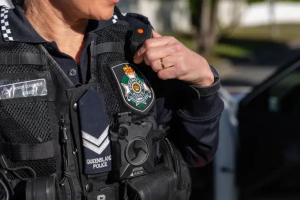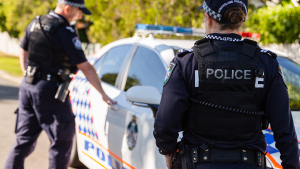Clarity Law

Jack Marshall
Jack is a former soldier and now a criminal defence lawyer with Clarity Law. He helps clients navigate the court process and get the best results.
Can what happens in court be published?
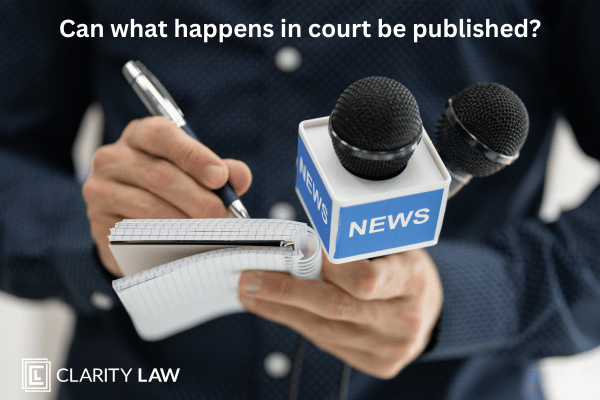
A question many clients ask, rightfully so, is will my criminal case be on the news or published on social media?
The answer to those questions are maybe.
In Australia there is a principle called the General Rule of Openness, which has been described as being a fundamental principle of our judicial system. The general rule is that all criminal court proceedings are open to the public and can be freely reported on. There are some exceptions to this rule, mainly surrounding Domestic Violence matters and matters relating to Children, such as Childrens Courts or where Children or victims of sexual assault are giving evidence.
Will there be a reporter in my court?
Whether or not there will be a reporter in court when your matter proceeds are in most cases impossible to tell. Unless you or your legal representative notices a reporter or journalist in the court, the chances are the first time you will know about it is when you see or are made aware of an article written about you.
What is the likelihood of this occurring?
While it is possible that there may be a member of the press in the gallery, the chances of that occurring in most courts is relatively remote. Courts like Court 35 in the Brisbane Magistrates Court which deals exclusively with traffic and drink driving matters, could reasonably expect a lower chance of media being present, than say the Supreme Court where a high-profile trial is going on.
The chances of media being present and whether they will report on a matter will depend on things such as the profile of the defendant and the offences which they have been accused of. Drink or Drug driving doesn’t typically draw the interest of the media unless there is an unusual characteristic about the offender, such as if they are a celebrity, athlete or even a person who is expected to uphold a greater sense of responsibility – like a Doctor, Principal or Lawyer.
Can I do anything to stop it?
Unfortunately, no. It is the general presumption that media are allowed to report freely on court cases, provided they are truthful and accurate. Journalists are required to follow the Court reporting guide for Journalists with respect of their conduct in court, and the Journalist Code of Ethics.
Can I ask the court to close for my matter?
There are exceptionally limited circumstances when the court will close to the public, including media. These include as written above, all children and domestic violence matters, when a witness giving evidence relating to a sexual assault and when a confidential informant is giving evidence.
Conclusion
While it is a naturally distressing time in your life, the thought of an additional punishment in the court of public opinion can add unneeded stress. It is for better or worse an underpinning principle that the administration of justice occurs openly and publicly. The only thing that a defendant can do, is focus on the conduct of their case.
Please note – we do not and cannot give advice on defamation relating to any news organisation publishing information about any case.
Brief of Evidence – why is it so important?

In this article we will very briefly cover what a Brief of Evidence is and why it is important to the conduct of a criminal or traffic matter.
It is important to distinguish that not every matter will have a Brief of Evidence produced. For a matter that is straightforward and uncomplicated, a Brief of Evidence is not going to be important – if there is no real question as to what occurred then the matter will progress without it. Producing a Brief of Evidence may have the detrimental effect of delaying your matter in this circumstance.
Criminal matters, much like most aspects of life is ambiguous and not always so clear cut. It is these times where your legal representative will request a Full Brief of Evidence.
What is a Brief of Evidence and how does it differ from the QP9?
The Brief of Evidence, rather self-referentially is all of the evidence on which the prosecution intends to rely in the matter. It often contains correspondence (such as text messages), footage from the Police during arrest and interviews, CCTV or witness provided footage, and statements from the officers involved, witnesses and importantly victims. The copies of these items are made available in the brief and will allow a defendant or their legal representative to do a thorough review of the evidence.
This information, prior to being formalised in a brief forms the basis of the QP9, which as I am fond of describing – is as a bias snapshot of a moment or moments in time, told from the perspective of the police aimed to securing a prosecution. This obviously doesn’t mean that facts have been exaggerated or added to make the charge seem stronger, however the QP9 can be wrong. Criminal Lawyers negotiate agreed facts on a regular basis.
Why do we need the BOE?
The BOE is absolutely necessary when conducting complicated case conferencing and giving a client their options regarding their position to defend some or all of their charges.
The BOE allows your legal representative to see what the prosecution are relying on and can then decide whether or not there is sufficient evidence to secure a prosecution or if there is room to mount a defence to the charge.
The Brief of Evidence is also critical when preparing a matter for a sentence and even more so when preparing for a trial, where the evidence will be tested.
How long does it take a Brief of Evidence to be produced?
The real answer is that there is no hard and fast time in which it takes for a Brief to be produced. The first instance will typically be the Court ordering the production of the brief, and giving a deadline for that production. But it is common that briefs are not produced by that time, this can be due to delays in scientific testing of evidence to witness availability.
If a brief is not disclosed in time, your legal representative will advise the court and the matter will usually be adjourned to allow additional time for the brief to be disclosed.
I have a Brief of Evidence for my matter, but haven’t engaged a lawyer – what are my options?
It is not uncommon for people to start their matter on their own and through the course of them handling their matter, they will be given a copy of their Brief. It is at this time, some people may become overwhelmed by the information they’ve been given or not understand how it relates to their legal options. You can absolutely bring your brief to a lawyer to get advice or to represent you. Good criminal defence firms can conduct a review of a Brief and give you your options, whether that means having them represent you or you continue your matter on your own.
It is typically in a person’s best interest to get legal advice when they have a matter that warrants the production of a Brief of Evidence. There can be a considerable amount of information in these Briefs which must be considered to determine what the best legal option is.
Conclusion
This article, is by no means a comprehensive review of what a Brief of Evidence is, or why it is important to engage legal representation when you have a matter that warrants one. This article is designed to give you an overview of a term that occurs in the course of many matters, to enable you to make the most informed decision before commencing on your legal journey alone or if you engage an experienced legal practitioner to assist you.
How a stealing matter is dealt with in court
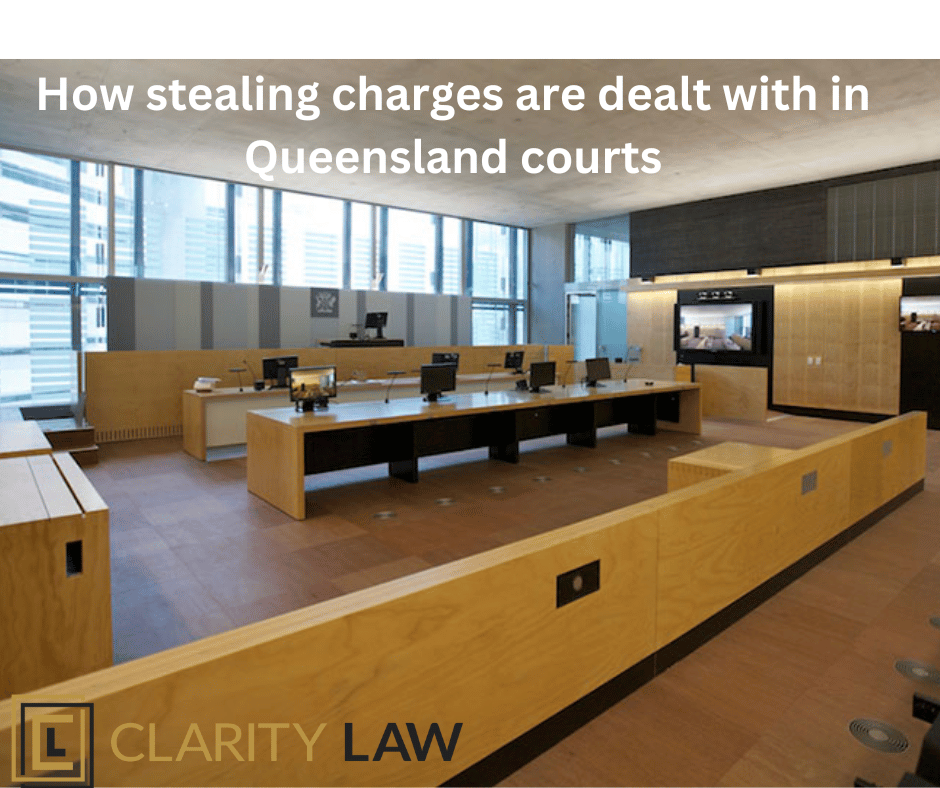
Our office has written in great detail about stealing offences here.
In short, a stealing offence occurs when a person has taken property (things capable of being stolen) with the intent to deprive the owner of the thing, to use as a security or used in a way that it cannot be returned in the condition it was in at the time of taking.
This article is not a detailed outline of the offence, but rather aims to give an outline about how a person could expect their stealing charge to progress through the court system where they intend to plea guilty. Your lawyer will review the matter and advise of any defences if they are available. If you are intending to challenge the charge then your matter will follow a different course than below.
This is not a substitute for tailored legal advice, but aims to clarify some of the uncertainty a person will experience.
Shoplifting –
Shoplifting – or unauthorised dealing with shop goods. This charge arises when a person has dishonestly taken or dealt with goods under a value of $150.00.
This is a matter that is dealt with in the Magistrate’s court and can usually be dealt with on the first occasion if the defendant intends to plea guilty to the charge.
The Court will take the defendants plea and then hear from the prosecution regarding the facts of the case. The Magistrate will then ask the defendant or their legal representative to say something about the defendant and give an explanation as to why the offence was committed.
The defendant will then stand and be sentenced. Given this is an offence against the Regulatory Offences Act, a defendant is liable to a fine of up to 6 penalty units.
How Stealing matters start
All stealing matters will start their life in the Magistrates Court, from there, depending on the seriousness of the offence or any circumstance of aggravation (such as if the value of the theft is over $30,000) the matter will then go through the process of committal and then indictment to the District Court.
Your will be required to attend court on the first mention in the Magistrates Court. You will be usually required to sign bail (see our article on bail here), then your lawyer will advise when you need to attend Court.
Stealing matters in the Magistrates Court
For the stealing matters that will remain in the Magistrates Court they will take one of two paths, either being dealt with in a short plea or where it will require a lengthy plea. The court will not typically hear a plea of guilty if the matter will take longer than 15 minutes in an arrest court (this could be Court 1 in the Southport or Beenleigh Magistrates Courts or Court 2 in the Holland Park Magistrates Court. This will depend on the practice directions of each specific court).
How long a stealing matter will take will depend on a number of factors, namely:
- the number of offences;
- the seriousness of the offending;
- the criminal history of the defendant; and/or
- a combination of all the above factors.
If the matter will be dealt with in 15 minutes or less, the matter can usually be dealt with either on the first mention or adjourned to another date for sentence in order to obtain material in mitigation of the sentence.
Short plea - A stealing matter will follow the same procedure as all Magistrates Court matters. The Magistrate will ask the defendant to stand and then read out the charge(s) and ask how the defendant pleas. The Magistrate may ask if the plea is of their own free will and/or if they have been promised anything or induced to make the plea.
The Police Prosecutor will then read the facts of the charge and may make a submission with respect of penalty.
Your lawyer will then stand and make submissions to the Court on your behalf, tendering any character references or other supporting material as necessary. Your lawyer will submit on penalty then the Magistrate will require you to stand and deliver the sentence.
A short plea can be dealt with as quickly as the first appearance date or adjourned to allow for the defendant to prepare material for their sentence. It is the quickest way to resolve a stealing offence.
Lengthy plea – A lengthy plea will follow the same procedure as a short plea, however the difference arises from the detail that will be given by both the prosecution and the defence.
The Police Prosecutor in a lengthy plea are more likely to make more detailed sentencing submissions than they would in a short plea. The prosecutor may tender comparative cases and have a more detailed back and forth with the Court.
Your defence lawyer will also make more in depth submissions to the Court regarding penalty and may provide case comparatives.
The Court may be more interactive with each of the parties, asking questions during submissions which may lead to lengthy discussions regarding the facts and how they compare to any tendered comparative cases.
The matter will then follow the same procedure for sentencing as a short plea.
This matter will usually not be heard on the first court appearance and will require adjournment to a specific date on which the court hears lengthy pleas. Courts have a backlog of lengthy pleas, so this may take a few weeks to progress to sentence date.
Matters that must be heard in the District Court
If your matter is to be heard in the District Court, you will be advised very early in the life of the matter. Your lawyer will identify if the matter must go up and will explain the process to you.
Very simply, the matter must be committed from the Magistrates Court to the District Court, where it will then be presented to the District Court on indictment. The Director of Public Prosecutions will take carriage of the matter once it goes up, and they have by law, 6 months to present the indictment. The upshot here is that a matter in the District Court can take a considerable amount of time to be dealt with.
Once the administrative process has occurred between your lawyer, the Court and the DPP it will come time for sentence. The District Court has a much more formal process to it than the Magistrates Court.
Depending on the seriousness of the offence, your lawyer will typically raise the discussion of engaging a Barrister (you might hear them also be called counsel) to do the sentence. Barristers are experts in District Court sentences and work closely with your lawyer in preparation for the sentence.
Once the sentence day comes around, your lawyer will explain exactly what will happen. In short, you will be required to be in the dock, which is the separate area for the defendant. The Judge’s associate will ask you to stand and read out the charges and ask you to enter your plea. As an example of the increased formality, the Associate will then read out your plea back to the Judge directly behind them. The Associate will then advise you that you have been convicted on your own plea and then ask if there is any reason sentence should not be passed on you. It is at that time you will sit down and the Prosecution will commence their case.
The Prosecution will read into the record the agreed facts of the case and then make their submissions with respect to penalty, relying on case comparatives to support their submission.
Your Barrister or Lawyer will then stand and make their own submissions about your background, the circumstances of the offending and provide their own case comparatives in support of the desired penalty.
This will follow a similar process as a Magistrates Court lengthy plea, just with additional formality and detail to correspond with the increased seriousness of the offence. Much like a lengthy plea, there may be some discussion between the Judge, the DPP and your lawyer/barrister during the process. This is normal and to be expected.
You will then stand and the Judge will read out your sentence. The Judge may adjourn the Court for a short time to consider what sentence they will pass.
Case Conferencing
During the course of your matter, you might hear your lawyer mention or talk about the case conferencing process. This is the process in which your lawyer will negotiate with the police prosecutor or the DPP.
The scope of the negotiation can be something as simple as negotiating the agreed facts of the case, or can include a written submission as to reducing or completely dropping some or all of the charges. This is an in depth process that takes some time to occur as it requires a detailed analysis and drafting of a legal argument to be sent to the prosecution and for their office to consider it.
Why get a lawyer
It should be clear from both our detailed article on stealing and the above, that a stealing charge can be a very complex and lengthy process to navigate. Engaging us gives you the best chance at obtaining the lowest penalty or avoiding a jail sentence if this is not your first offence. We are one of the leading criminal law firms in South East Queensland. We appear every week in the courts with people charged with stealing, it is this experience that allows us to get the best result for clients. Other law firms simply don’t have the experience that we do and don’t know the judges like we do. Just some of the benefits of us acting for you include;
- we know the judges and what they want to hear to give you the best outcome
- we have good relationships with the prosecutors meaning we can often have them not seek a jail sentence
- we are there to help you through the process and make everything as stress free as possible, in most cases you will not have to say anything in court
- engaging us shows the court you are taking your charges seriously
- your matter will be heard early, often first, you do not have to wait for 20-30 other matters to be heard before you
- you will be fully informed of what is to happen in court and what this means for you after court
- unlike the police or the Judge, we are there to look after you, your privacy and your interests
If your matter is going to progress by a lengthy plea in the Magistrates Court or on indictment to the District Court you will be engaged with your lawyer for a not insignificant period of time. Clarity Law’s lawyers all pride themselves on ensuring that you truly understand what is happening with your matter, that you have confidence and know that we are acting in your best interest. That is the Clarity Law difference and our record reflects this approach.
If you want to engage us or just need further no obligation information or advice then you can either;
1. Use our contact form and we will contact you by email or phone at a time that suits you
2. Call us on 1300 952 255 seven days a week, 7am to 7pm
3. Book a time for us to call you
4. Email the firms founder This email address is being protected from spambots. You need JavaScript enabled to view it.
5. Send us a message on Facebook Messenger
What is an arrest warrant?
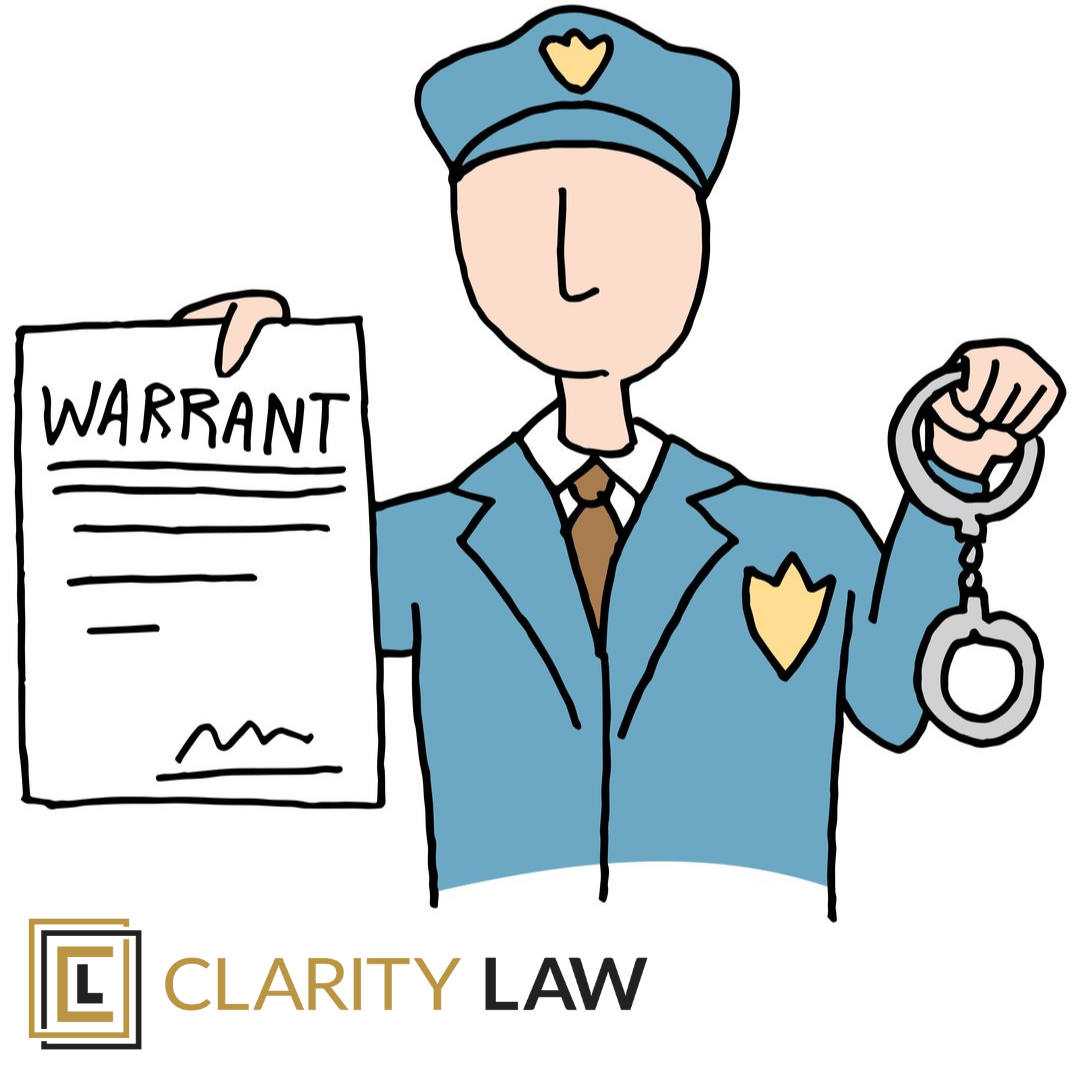
An arrest warrant is a warrant that is either applied for and obtained by the police or ordered by a justice (including a Justice of the Peace, Magistrate, Judge or Justice). It gives a member of the police the authority to detain the named person for the purpose of questioning or to charge a person with an offence.
If you have been arrested by the police for a fail to appear in court, then you are likely to be detained until you can be brought before a magistrate at the next available opportunity.
How do I know if a warrant has been issued?
Unfortunately, you generally will not know that an arrest warrant has been issued until you receive the knock on the door to execute the warrant or are pulled over by police and detained.
You may have some knowledge if an arrest warrant has been issued. If you realise you have missed a court date, then you will likely have a fail to attend and the Court more than likely has issued a warrant for your arrest. If this is the case, do not wait to be arrested, call a criminal lawyer who can give you advice on surrendering to the court.
What do I do if an arrest warrant is executed?
If the police execute an arrest warrant on you, you must remain calm and comply with the directions of the police officers. You do not have to say anything to them other than give your ‘identifying particulars’, however you need to follow their lawful directions – such as being fingerprinted or escorted back to the police station with them.
If you resist arrest or obstruct the police in the execution of a lawful arrest police can charge you with an offence.
It is best to comply with the execution of the warrant and engage with a criminal defence lawyer once you have been granted watchhouse bail or require a bail application in the Magistrates Court.
If you have been arrested, you still have rights. Steven Brough our founder has written an excellent article on what to do if you have been arrested here. Put simply, you have a right to silence but you are required to give your name, address and date of birth. It is the default position of most criminal defence lawyers that you do not participate in an electronic record of interview. If you have been asked to participate in an electronic record of interview, you may contact our office for advice.
What can I do if I think a warrant has been issued but before I’ve been arrested?
If you are going to surrender yourself to the court as the court has issued a warrant for your arrest, it is best to do this first thing in the morning as, if you attend late in the afternoon, you may be kept in the watchhouse overnight until the police and court can process you and allocate you a new court date. There is of course the risk that the police could arrest you if you wait and take you to the watchhouse overnight anyway.
You surrender yourself by appearing at the registry of the court you were allocated to attend. There you advise them that you missed your court date and need to surrender yourself. As both the court house and the Police are involved in the process it can be a lengthy period, taking on average 1-2 hours.
If you engage a lawyer to surrender you to the court, the process remains largely the same, with the exception that a lawyer will arrange with the court and police for the file to be brought before the court and can assist in providing an explanation as to why you failed to attend court.
We have a full article on what to do if you have missed your court date.
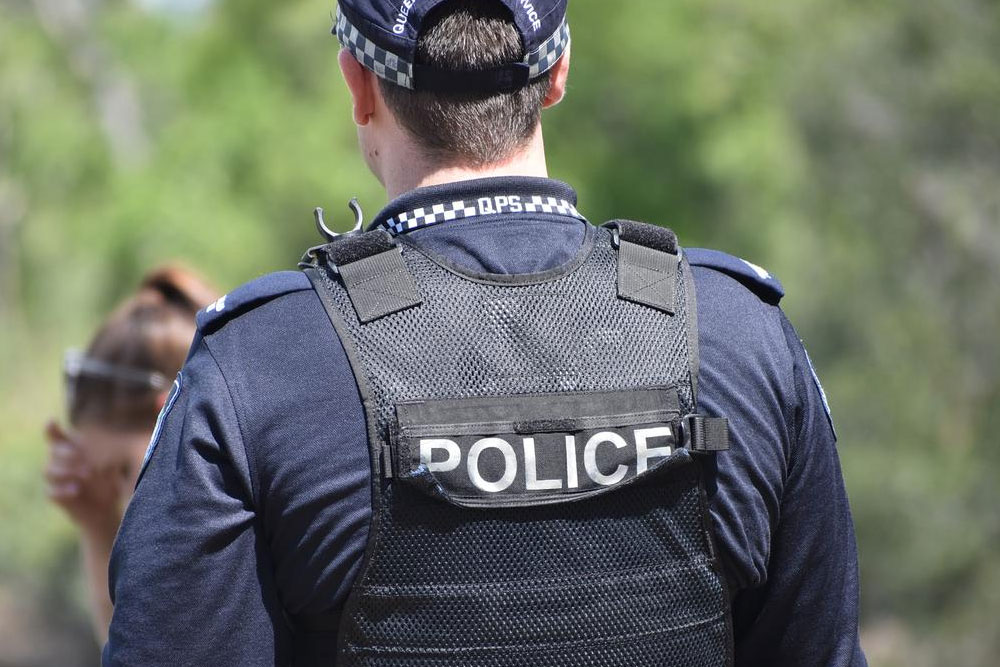
What can a lawyer do for me if a warrant is issued?
In short, with the exception of surrendering you to the court, there is not much a lawyer can do to stop a warrant being executed – that is not our role – if an arrest warrant is executed on you, you are within your rights to call a lawyer to get advice. A lawyer can be in attendance with you while you are being questioned by police however a lawyer becomes more and more relevant in the aftermath – whether that is helping you defend a charge or make a plea of guilty.
Conclusion
This article is by no means a comprehensive guide to arrest warrant and what you need to do when one has been issued. They are complex and powerful instruments which police utilise in the execution of their duties. A lawyer will become most relevant for you in the aftermath of the execution of a warrant, however your conduct during the execution will set the stage for that aftermath. Anything said during an interview can and will be used against you in court.
How do I get more information or engage Clarity Law to act for me?
If you want to engage us or just need further information or advice then you can either;
- Use our contact form and we will contact you by email or phone at a time that suits you
- Visit our website at www.claritylaw.com.au
- Book a time for us to call you
- Call us on 1300 952 255 seven days a week, 7am to 7pm
- Email our firms founder This email address is being protected from spambots. You need JavaScript enabled to view it.
What do I do when I have missed my court date!

If you have missed a court date there will more than likely be a warrant out for your arrest.
If you believe that you may have a warrant issued for your arrest, you can contact the court and check and if a warrant was issued then surrender yourself to the court. Do not wait to be arrested.
If you are arrested, then you will likely face a charge of fail to appear in accordance with an undertaking (if you were on bail) which likely will trigger the revocation of your bail and put you in a ‘show cause’ position.
Surrendering yourself to the court will result in a better outcome than if you were arrested and brought before the court.
How do I surrender?
If you are going to surrender yourself. It is best to do this first thing in the morning as, if you attend late in the afternoon, you may be kept in the watchhouse overnight until the police and court can process you and allocate you a new court date. There is of course the risk that the police could arrest you if you wait and take you to the watchhouse overnight anyway.
You surrender yourself by appearing at the registry of the court. There you advise them that you missed your court date and need to surrender yourself. As both the court house and the Police are involved in the process it can be a lengthy period, taking on average 1-2 hours for your file to be brought to the attention of the court. The court may wait until it has dealt with the represented matters first, and then the unrepresented matters.
The court will want to hear your reasons for not appearing in court, and will ask you what you want to do with your matter. The court will want to know if you are pleading guilty, wanting to adjourn the matter for legal advice or challenge the offence.
There is no requirement to surrender to the court that has issued the warrant, this is clearly expressed in the Police Powers and Responsibilities Act 2000, section 389(4). This section states if a person appears voluntarily before a court after the warrant is issued, any justice may revoke the warrant however some court registries take a different view and may seek to tell you that you cannot surrender in their court and must at the court that issued the warrant.
Why should I get a lawyer to surrender me?
The above process, seems simple enough to do – which may cause a person to think, why should I pay a lawyer to help. This ultimately, will depend on the circumstances. For serious offences, or where a person has a history of failing to appear then having a lawyer appear for you is imperative to ensure that you put your best case forward as to why you should be allowed to be granted bail or allowed at large.
In some instances, a defendant simply does not feel confident in appearing before the court to explain why they failed to attend. There is no one reason as to why you should engage a lawyer to assist.
Each of our lawyers are experienced with the specific requirements of surrendering a defendant to the court, ranging from a defendant missing a court date due to illness to something at the more extreme of a defendant remaining outside of Queensland for 20 years.
If I get a lawyer to surrender me to the court, do I have to use them for my matter?
The short answer is no. If you wish to handle your matter on your own then you are under no obligation to have the lawyer that helps with the surrender continue to work on your matter. If this is the case, it is best to tell them upfront so that they can ensure that they do not remain on record for the matter. You may even ultimately decide to retain their services for the duration of the matters as a result of your experiences with them.
Can I surrender and just deal with the charge that caused the warrant straight away?
The short answer is generally yes however it very much depends on the charge. If the charge is something like drink driving then you may try and deal with the charge straight away after surrendering however if you are after a work licence than you must not deal with the charge straight away. If the charge is more serious then you should not (and may legally be unable) to deal with the charge after the surrender.
You would need legal advice on whether you can deal with the charge straight away. Certainly if possible and if your best interests dealing with the charge might be the most efficient way but always get legal advice on this first as the wrong move can have significant consequences.
Conclusion
This article is by no means a comprehensive outline on how to surrender to the court and should be read in conjunction with our article on arrest warrants.
The key takeaway from this article is simple – do not wait to be arrested take positive action before that occurs
What courts do you cover?
We cover all courts in South East Queensland from Coolangatta to Hervey Bay and out to Toowoomba.
We are also a criminal law firm, we don’t do any other type of law so we are in the courts every day helping people with charges like this.
Just some of the courts we appear in to surrender are;
Holland Park Magistrates Court
Maroochydore Magistrates Court
How do I get more information or engage Clarity Law to act for me?
If you want to engage us or just need further no obligation information or advice then you can either;
1. Use ourcontact formand we will contact you by email or phone at a time that suits you
2. Call us on 1300 952 255 seven days a week, 7am to 7pm
3. Book a time for us to call you
4. Email of firms founder This email address is being protected from spambots. You need JavaScript enabled to view it.
5. Send us a message on Facebook Messenger
We are a no pressure law firm, we are happy to provide information to assist you and a fixed price for your services, if you want to engage us then great, if not then you at least have more information. You wont be chased or hounded to engage us. Remember its critical you get advice before going to court, this offence can have an impact on you, your family and your employment or business.
Jacks Law
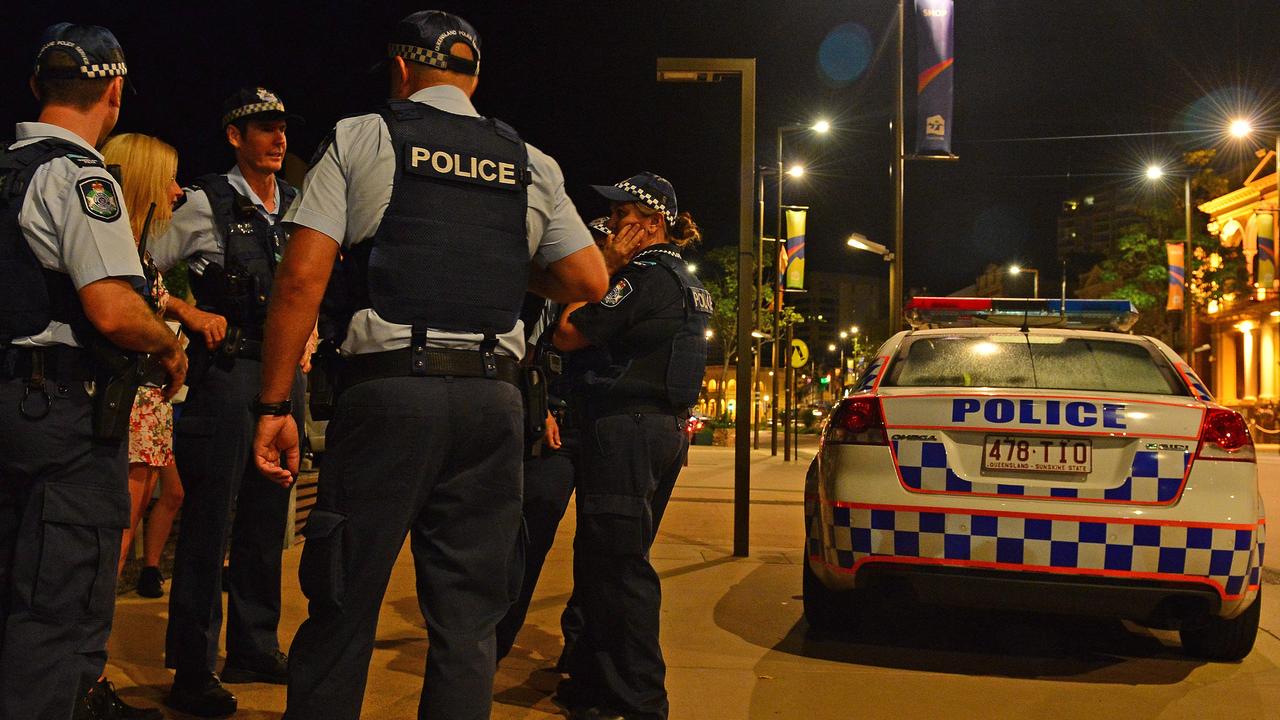
If you are in Fortitude Valley or the Surfers Paradise safe night in the near future, you will undoubtedly see members of the Queensland Police Service with a metal detector scanning people on the street.
Is this legal? Do police have a search warrant? What happens if I don’t wish to comply?
These are all good questions. This new power has come about as a result of a recent amendment to the Police Powers and Responsibilities Act, known as ‘Jack’s Law’. Jack’s Law is aimed at fighting knife crime in safe night precincts and at public transport stations (such as train stations).
A senior police office may authorise the deployment and use of a handheld scanner (or wand) in a designated safe night precinct or public transport station if a series of criteria regarding weapons offences have occurred in that area. In such event, a notice must be published about the use of the handheld scanners within the area – however it may be unlikely that the vast majority of the public actually see the notice.
Why might I be searched?
Anybody in one of the above nominated areas where a hand held scanning notice has been published may be stopped and required to submit to wanding. NOTE While the police have the authority to wand a person, this does not authorise police to conduct a search without a warrant beyond the exercise of this power.
If the police decide to wand you, they must exercise their power in the least invasive manner possible and if practicable ensure that the search is conducted by a member of the same sex as the person being searched. Police have the power to detain a person for as long as reasonably necessary to complete the wanding and the police officer must:
- if requested by the person, inform the person of the police officer’s name, rank and station; and
- if requested by the person, provide the information mentioned in paragraph (a) in writing; and
- produce the police officer’s identity card for inspection by the person unless the police officer is in uniform; and
- inform the person that the person is required to allow the officer to use a hand held scanner to determine whether the person is carrying a knife or other weapon; and
- offer to give the person a hand held scanner information notice and, if the person accepts the offer, give the notice to the person.
If metal is detected by the officer, you may be required to produce the item which has set off the scanner (such as keys, phone, belt buckle ect) and resubmit to be wanded again. Much like going through the metal detectors at a domestic or international airport.
It is an offence to not comply with the direction of police without a reasonable excuse. If, without a reasonable excuse you do not submit to the wanding police may charge you with Obstruct/Assault Police or more likely Contravene direction or requirement of a police officer. At the time of writing, there is limited guidance surrounding what offence someone will be charged with.
If police located a knife or weapon (such as screwdriver ect), you will likely be charged under the Weapons Act with possess knife in a public place or a like offence.
The above is a general outline about a recent change in law. If you have been charged with an offence for failing to submit to being wanded or with possessing a knife feel free to contact our office for an obligation free consultation.
How do I get more information or engage Clarity Law to act for me?
If you want to engage us or just need further information or advice then you can either;
-
Use our contact form and we will contact you by email or phone at a time that suits you
-
Visit our website at www.claritylaw.com.au
-
Call us on 1300 952 255 seven days a week, 7am to 7pm
-
Book a time for us to call you
-
Email our firms founder on This email address is being protected from spambots. You need JavaScript enabled to view it.
Do you have to give the police access to your phone?
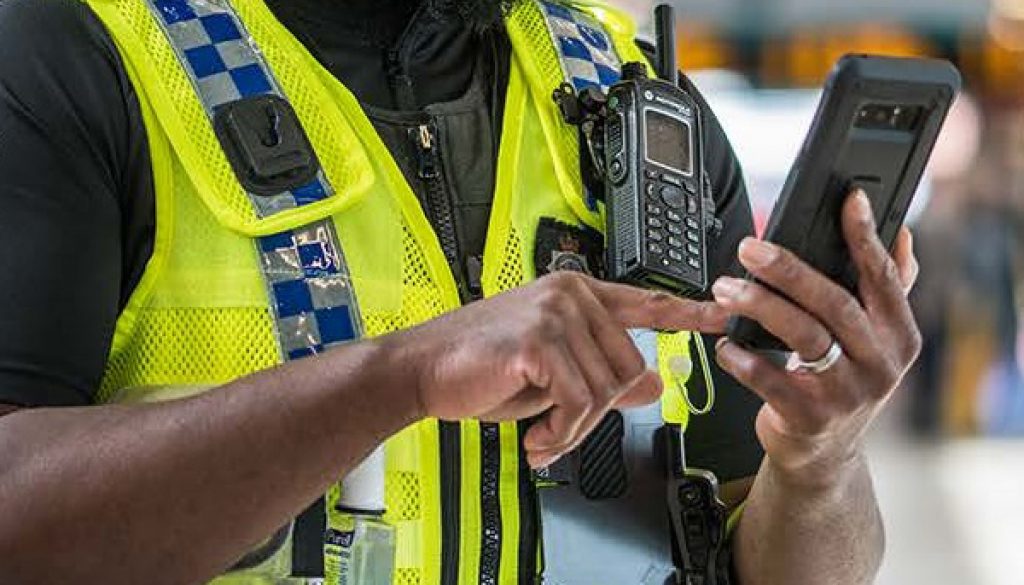
Introduction
Contravene order about device information from digital device (or a section 205A offence) is a charge which a defendant may find themselves facing in the event that they refuse to allow access to their devices when required by a search warrant under ss 154(1) or (2), 154A (2) or 178A(1) of the Police Powers and Responsibilities Act 2000 (PPRA).
The offence is taken very seriously by the courts and arose as a result of changes to the Criminal Code aimed at addressing serious and organised crime. The District Court of Appeal say that the offence is a serious one which strikes at the heart of the administration of justice. It involves a failure to comply with a court order. It follows that in considering the penalty to impose, it is necessary to take into account the need for general deterrence and denunciation.
Elements of the offence
The offence is a straightforward one, it arises when a person who, without reasonable excuse fails to give access to an electronic device when served with a relevant warrant under the PPRA or the Crime and Corruption Act.
This may look like refusal to give the password to an identified laptop or mobile phone during the execution of a search warrant.
It is important to note that Police in the serving of a warrant that contains the authority to search devices, must notify a person that failure to comply without a reasonable excuse constitutes an offence against s205A of the Criminal Code.
Defences
The key defence available for a defendant is having a reasonable excuse for not giving access to the device. The Court has determined that a reasonable excuse takes its ordinary meaning, effectively “would the average person believe that the excuse is reasonable”. The key case for the defence of reasonable excuse is Commissioner of Police v Barbaro [2020] QCA 230, where the court found that legal professional privilege is protected and could constitute a reasonable excuse. The Court made a clear distinction that not every instance where privilege is claimed will be a reasonable excuse, it will depend on circumstances and will be on the defence to establish a claim for privilege.
This is not the only example of a reasonable excuse, in early 2023 the Court determined in Queensland Police Service v Ahmed [2023] QMC 2, that the defendants excuse of not allowing male officers access to his device was reasonable, as the defendant’s phone contained photographs of his “uncovered” wife (note – the court heard and was satisfied that the defendant held genuine religious beliefs which would have been infringed had he allowed another male to view his uncovered wife). The court held that (amongst deficiencies in the prosecution case) a genuine religious belief could be constituted as a reasonable excuse to not comply with a warrant to provide access.
The legislature has deliberately excluded self-incrimination as a reasonable excuse. That is to say, it is not a reasonable excuse to not comply, if complying would incriminate you of an offence. This is consistent with the legislative intent for allowing law enforcement to conduct investigations into offences.
Why should I contact a lawyer if I am charged with this offence?
The simple answer is that the Court takes this charge very seriously. The most common penalty for this offence is a period of imprisonment, either wholly or partially suspended or to be served in actual custody.
The next question you might ask, is “if I am going to receive a sentence of imprisonment, why should I get a lawyer?” There are four different means in which imprisonment can be served (Russell Tannock of our office has written a comprehensive article here).
By engaging Clarity Law we are able to ascertain whether there is an available defence. We are able to review your case and assist in obtaining the best available outcome in the circumstances.
Conclusion
This article, is by no means a complete guide to this type of offence, but should be a useful starting point for someone who has been charged but not yet been to court. If you are charged with an offence, please contact our office for a free initial consultation.
How do I get more information or engage Clarity Law to act for me?
If you want to engage us or just need further no obligation information or advice then you can either;
1. Use our contact form and we will contact you by email or phone at a time that suits you
2. Call us on 1300 952 255 seven days a week, 7am to 7pm
3. Book a time for us to call you
4. Email the firms founder This email address is being protected from spambots. You need JavaScript enabled to view it.
5. Send us a message on Facebook Messenger
Wilful Exposure
Charged with wilful exposure, or just want to know more about the charge?
What is Wilful Exposure
Wilful exposure is an offence which arises when a person wilfully exposes his, her or their genitals in a public place, unless that person has a reasonable excuse.
A person may also be guilty of Wilful exposure if, from a private place, that is so close to a public place that it could be seen from a public place, they wilfully expose their genitals so that they may be seen from the public place, without reasonable excuse.
The offence is made more serious if in the course of the exposure, it is done with the express purpose of offending or embarrassing another person.
The penalty for this offence carries a maximum penalty of—
(a) 2 penalty units; or
(b) if the offence involves circumstances of aggravation—40 penalty units or 1 year’s imprisonment.
What does the prosecution need to prove?
To be found guilty of wilful exposure, the Police Prosecution Corps must prove, beyond a reasonable doubt the following:
- the defendant wilfully;
- exposed their genitals;
- in a public place; or
- from a place that is so near a public place that it may be seen from the public place.
Note: It is sufficient for item 4 above, for a person to stand in their private residence in a street facing room (meaning facing the road) where that person could be seen from the road
Are there any defences?
The simple answer is yes. There are a number of defences that are available;
- The alleged act was not in or near a public place;
- The defendant did not wilfully expose their genitals;
- The defendant was in fact not the person whom is alleged to have committed the act (identification issue); and
- That any such exposure was not done with the intent to offend or embarrass a person (if applicable).
It is not an offence of wilful exposure for a person to breastfeed a child in public or near a public place. This is a protected act under the anti-discrimination legislation and does not constitute an offence. If you have been charged with an offence of wilful exposure due to breastfeeding in public, contact our office for a free initial consultation.
Why should I choose you and not just represent myself?
Just some reasons include;
- we know the Magistrates and what they want to hear to give you the best outcome for a wilful exposure charge
- we have good relationships with the police prosecutors meaning we can often have them agree to the sentence we are asking the court to impose
- we are there to help you through the process and make everything as stress free as possible, in most cases you will not have to say anything in court
- engaging us shows the court you are taking your charges seriously
- your matter will be heard early, often first, you do not have to wait for 20-30 other matters to be heard before you
- you will be fully informed of what is to happen in court and what this means for you after court
- unlike the police or the magistrate, we are there to look after you, your privacy and your interests
Our experienced solicitors understand the sensitivity and potential embarrassment this charge may have on someone, any conversation had with our office is strictly confidential, with as few eyes on your file as necessary.
Conclusion
This article is by no means an exhaustive guide to this offence, but stands as a handy ready reckoner for someone looking for more information on or being charged with the offence. If you are charged with the offence, please contact our office for a free initial consultation.
How do I get more information or engage Clarity Law to act for me?
If you want to engage us or just need further information or advice then you can either;
- Use our contact form and we will contact you by email or phone at a time that suits you
- Book a time for us to call you
- Call us on 1300 952 255 seven days a week, 7am to 7pm
- Email This email address is being protected from spambots. You need JavaScript enabled to view it.
Contravene direction or requirement
The charge of Contravene direction or requirement is a common charge defendants can find themselves falling afoul of. The scope of the offence is broad, however generally would fall into two categories:
- Failing to comply with a “move on” (or other like) order from a Police Officer; and
- Failing to comply with a direction regarding a public official, such as not giving your name, address and date of birth to a public official. Note, it is a separate offence to obstruct or impede a Police officer in the conduct of their duties.
The offence
The offence, generally speaking is less serious than a similar offence of obstruct/assault Police. It is also critical to note that this offence does not cover a circumstance where a person fails to provide a specimen of breath for a roadside or BAS reading, as that is a separate and often serious offence.
For a person to be charged with the offence, the following must have occurred:
- A Police Officer has given a reasonable direction or requirement in the following circumstances:
- Required a person to give their name, address and date of birth to a public official; or
- Obstructed a public official in the exercise of that official’s duties; or
- Ceasing to comply with reasonable direction (a “move on” order) in circumstances where a person’s conduct is:
- causing anxiety to a person entering, at or leaving the place, reasonably arising in all the circumstances;
- interfering with trade or business at the place by unnecessarily obstructing, hindering or impeding someone entering, at or leaving the place;
- disorderly, indecent, offensive, or threatening to someone entering, at or leaving the place;
- disrupting the peaceable and orderly conduct of any event, entertainment or gathering at the place; and
- A person or persons have, without a reasonable excuse contravened the requirement or direction.
For the charge to succeed, the Police Officer must give a warning that by failing to comply with the direction or requirement, the person is committing an offence.
NOTE, the offence becomes more serious (aggravated) if the offence occurs in (or in close proximity to) a licenced premises, or a public place that is designated as a safe night precinct (i.e Surfers Paradise, The Strand or Fortitude Valley).
Defences
In some cases, it is a defence to have a reasonable excuse for not complying with the direction. Reasonable excuse, does not have a hard and fast definition – but is more in the manner of interpretation. In essence, would an ordinary person consider that the excuse to not comply was reasonable?
It is further accepted that, unless it is specifically provided by law, it is a reasonable excuse to not comply with a direction or requirement, if doing so would tend to incriminate the person. Some specific exceptions to this rule relate to authorisation and conduct of forensic procedures, such as DNA collection.
Penalty
In most circumstances, the offence is a fine only offence (some exceptions apply depending on the specific nature of the contravention), however this does not mean that it is something that should be taken lightly. A conviction for the offence may have a significant impact on a person, especially in circumstances where other criminal matters are present.
The maximum fine penalty will depend on whether or not the previously noted aggravating features are present.
If a person commits the offence in a prescribed place, the maximum fine is 60 penalty units (at time of writing is $8,675.00) plus the Court offender levy, which if heard in the Magistrates Court is currently $133.60.
Otherwise, a maximum fine of 40 penalty units ($5,750.00) plus any relevant offender levy.
Can Clarity Law help me?
It is understandable that for a person who is a first-time offender, they may wonder why they should engage a lawyer to act for them when they face a single contravene direction or requirement offence.
Our dedicated team has experience handling these matters. Your Clarity Law solicitor will carefully review and consider your case and may be able to engage with prosecutors to negotiate depending on the facts. Engaging an experienced lawyer (such as us) will allow you to explore your options with respect of the offence, assist in reducing the fineable amount and improving the likelihood of no conviction being recorded.
We also have fixed prices so you know with certianty what you will pay. Our prices can be found here.
Conclusion
This article, is by no means a complete guide to this type of offence, but should be a useful starting point for someone who has been charged but not yet been to court. If you are charged with an offence, please contact our office for a free initial consultation.
How do I get more information or engage Clarity Law to act for me?
If you want to engage us or just need further information or advice then you can either;
- Use our contact form and we will contact you by email or phone at a time that suits you
- Book a time for us to call you
- Call us on 1300 952 255 seven days a week, 7am to 7pm
- Email This email address is being protected from spambots. You need JavaScript enabled to view it.


